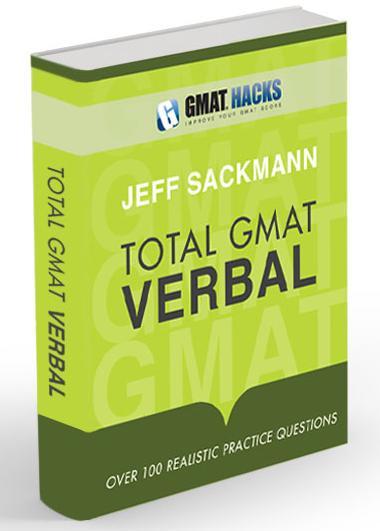
Bookshelf
|
|
Total GMAT Math Jeff's complete Quant guide, on sale now! |
|
|
Total GMAT Verbal Everything you need to ace GMAT Verbal! |
1,800 Practice Math Questions
Buy Jeff's books at Amazon.com

GMAT Official Guide, with IR
OG Math | OG Verbal
OG12 & Quant Rev solutions!
GMAT Question of the Day
Beginner's Guide to the GMAT
GMAT Hacks Affiliate Program

Recent Hacks

Categories
- General Study Tips
- Goals and Planning
- CAT Strategy
- The Mental Game
- GMAT Math Strategy
- GMAT Math Topics
- Mental Math
- Data Sufficiency
- Critical Reasoning
- Reading Comprehension
- Sentence Correction
- Analytical Writing Assessment
- Integrated Reasoning
- IR Explained
- Business School Admissions
- GMAT Prep Resources
- Practice Questions
- Total GMAT Math
- Total GMAT Verbal
- GMAT 111

Slow Down to Speed Up Later
| You should follow me on Twitter. While you're at it, take a moment to subscribe to GMAT Hacks via RSS or Email. |
Many people associate being good at math with being able to do math quickly. There's plenty of truth to that: usually, when you struggle with something, it takes longer than if it's a strong point for you.
However, when you're preparing for the GMAT Math section, don't work quickly for the sake of working quickly. Speed on math questions isn't something you can develop by trying really hard and moving your pencil faster: it will come when you are more comfortable with the underlying concepts. For that reason, make a concentrated effort to slow down.
First, Slow Down
It's frustrating, I know. You realize that, on test day, you need to be able to do every math question in about two minutes. Why should you go slower than that when you're practicing?
A metaphor I've grown to like lately is between GMAT prep and learning to play the piano. Good pianists know that you don't get better by practicing at the proper tempo; at first, you have to practice at whatever tempo is necessary to perform perfectly. Sometimes the results are bizarre: in order to play an up-tempo piece, the practicer might need to take it at half-speed or even slower.
However, by playing it at half-speed, piano players learn the piece–they "get it under their fingers." Once they can play it perfectly at a very slow speed, they keep practicing, gradually speeding up. The focus is on perfection first, speed second.
You Can Speed Up Later
Just as pianists eventually develop the technique to play pieces at the proper tempo, you can learn to do GMAT math problems in two minutes. But only after you've developed the skills to do them perfectly.
The most common problem I see in students who are struggling with basic- to medium-level math is that they skip steps. They don't realize it, and they aren't even consciously trying to go faster, but they skip steps that help them understand the question better. Rather than writing down a necessary question (such as distance = rate times time) and then filling in the variables with numbers, they try to write down the numbers in final form.
I'm a 99th-percentile GMAT test-taker, and I don't do that, ever. I suppose I could, if I wanted to, but in order to make sure I understand the question and avoid careless mistakes, I write out nearly every step of the process. Whether you're a 90th-percentile test-taker or a 9th-percentile test-taker, you should too.
Perfect Practice Makes Perfect
If you've spent much time on this site, you've probably read my article called "How to Do Practice Problems." Ever since I developed that method, I've sworn by it, and my students have seen greater improvements in their test scores. By slowing down when you are developing skills, you force yourself to practice perfectly. Quality is more important than quantity.
Also in that article, I note the importance of re-doing questions. Don't just review the explanations: do the question over again. Quite literally, this is like the practice regimen of a pianist. It isn't good enough to be able to play the piece (or find the right answer). You need to be confident, prepared, and skillful enough that you will find the right answer in a reasonable amount of time every time you see that question.
By using the metaphor of piano practice, think of the GMAT as a concert you're preparing for. It's okay to skip questions, but whatever you plan on doing on test day, learn it inside and out. Plan on being 100% confident in whatever skills you've built. Preparing in this manner will help you learn more content, and it will allow to be more relaxed when you take the test.
Both of those results will improve your score. That's what you're here for, right?
About the author: Jeff Sackmann has written many GMAT preparation books, including the popular Total GMAT Math, Total GMAT Verbal, and GMAT 111. He has also created explanations for problems in The Official Guide, as well as 1,800 practice GMAT math questions.
 |
Total GMAT Verbal
The comprehensive guide to the GMAT Verbal section. Recognize, dissect, and master every question type
you'll face on the test. Everything you need, all in one place, including 100+ realistic practice questions. |